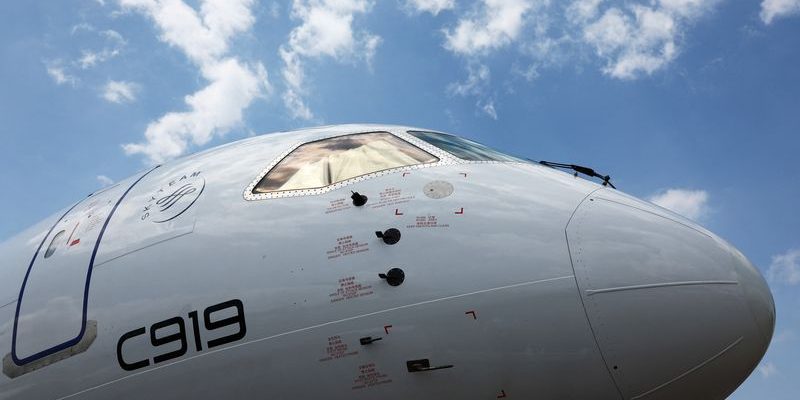
By Luciana Magalhaes and Gabriel Araujo
SAO PAULO (Reuters) – Brazil’s Total Linhas Aereas, a small cargo and charter airline, aims to become the first firm outside Asia to buy aircraft from China’s state-owned planemaker, which is trying to break into a global passenger jet market dominated by Western manufacturers.
Total and the Commercial Aircraft Corporation of China (COMAC) have been in talks for months, said the airline’s controlling partner Paulo Almada, who will visit COMAC in October to discuss a potential order of up to four C919 planes.
Brazilian Ports and Airports Minister Silvio Costa Filho said Total sought out the government to share its intentions, but has not presented any formal plan so far.
A deal could foster closer Brazil-China ties in the aviation sector ahead of Chinese President Xi Jinping’s state visit in November. Yet some industry observers have voiced skepticism about Total’s business plan for the Chinese jets.
“Even if Total is getting a great deal on the aircraft, its unproven reliability record and lack of support network in Brazil make it a very risky choice,” PA Consulting Aviation Partner Carlos Ozores said.
Total’s Almada said the airline was forced to look beyond traditional Western manufacturers such as Airbus and Boeing (NYSE:BA) because they were unable to meet demand for new planes as they grapple with supply chain constraints.
Brazil’s Embraer has production slots available from 2026 but only offers passenger jets with under 150 seats.
“The industry is dealing with supply shortages, but COMAC told us they could deliver the aircraft by next March,” said Almada, who declined to share documents from the negotiation, citing a non-disclosure agreement.
A deal could be a “milestone” for Brazil, said Senator Rogerio Carvalho of the ruling Workers Party, who took part in meetings with Total. Brazil would expect reciprocity, he added, with an increase in Chinese demand for Embraer jets.
Embraer considers China a key market, but has struggled to find new business there since the 2016 closure of a joint venture in Harbin.
After Brazilian President Luiz Inacio Lula da Silva visited Beijing last year, Embraer inked a deal to convert 20 of its aircraft into cargo planes with a partner in Lanzhou, frustrating hopes for passenger jet sales to a Chinese airline.
FINANCING, CERTIFICATION
Talks between Total and COMAC have included the possibility of financing from the China Development Bank for 80% of the total value in up to 10 or 12 years, Almada said, adding that each C919 had a list price of about $90 million.
COMAC and the China Development Bank did not immediately respond to requests for comment.
The existing Total fleet consists of ATR 42-500 turboprops and Boeing 737-400 freighters. The C919 seats up to 192 people and competes in a similar category to the Boeing 737 and Airbus A320.
Only nine C919s are currently in service since they started commercial operation in May 2023, all with Chinese airlines.
Outside China, the only carrier to operate a COMAC plane is Indonesian low-cost carrier TransNusa, which flies the smaller ARJ21 regional jet, which was certified a decade ago. A Brunei-based startup airline, GallopAir, has ordered ARJ21s and C919s.
COMAC this year has increased sales and production plans and has been marketing the C919 outside China.
Almada said Total would fly the C919s on charter-style flights booked by other airlines on an Aircraft, Crew, Maintenance and Insurance (ACMI) basis, which the industry uses to meet urgent or seasonal demand. Pilots and mechanics would be trained in China by COMAC, he said.
A major hurdle for the C919 is that it lacks certification outside of China, particularly benchmark certifications from the U.S. and European Union. The European Union Aviation Safety Agency (EASA) is currently evaluating the plane.
Total would also push to get the Chinese planes certified in Brazil, Almada said.
Brazil’s civil aviation agency ANAC said a formal request for certification has not yet been filed.












